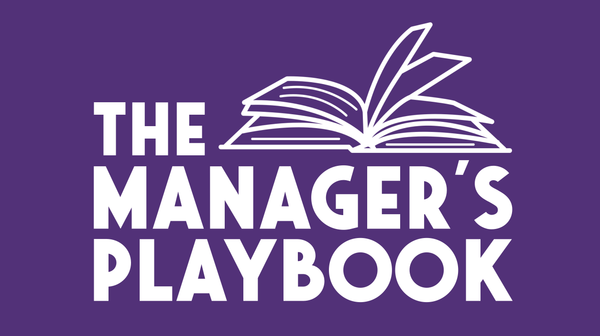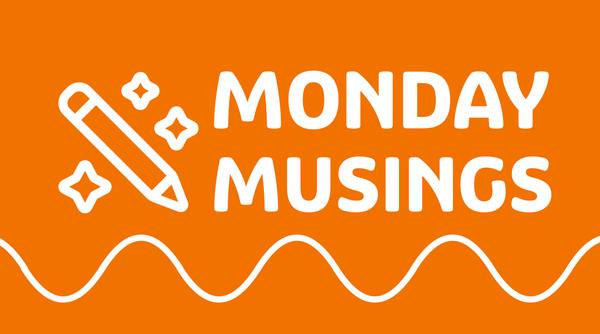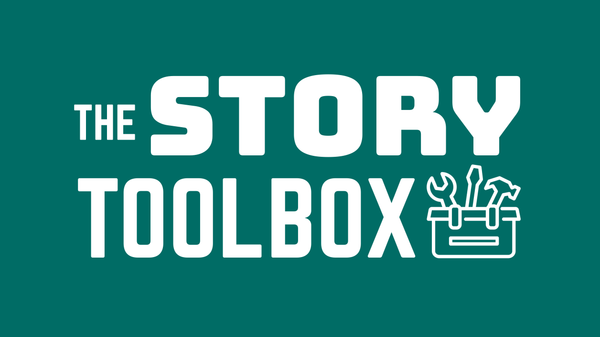A Framework for Brainstorming Talk Ideas
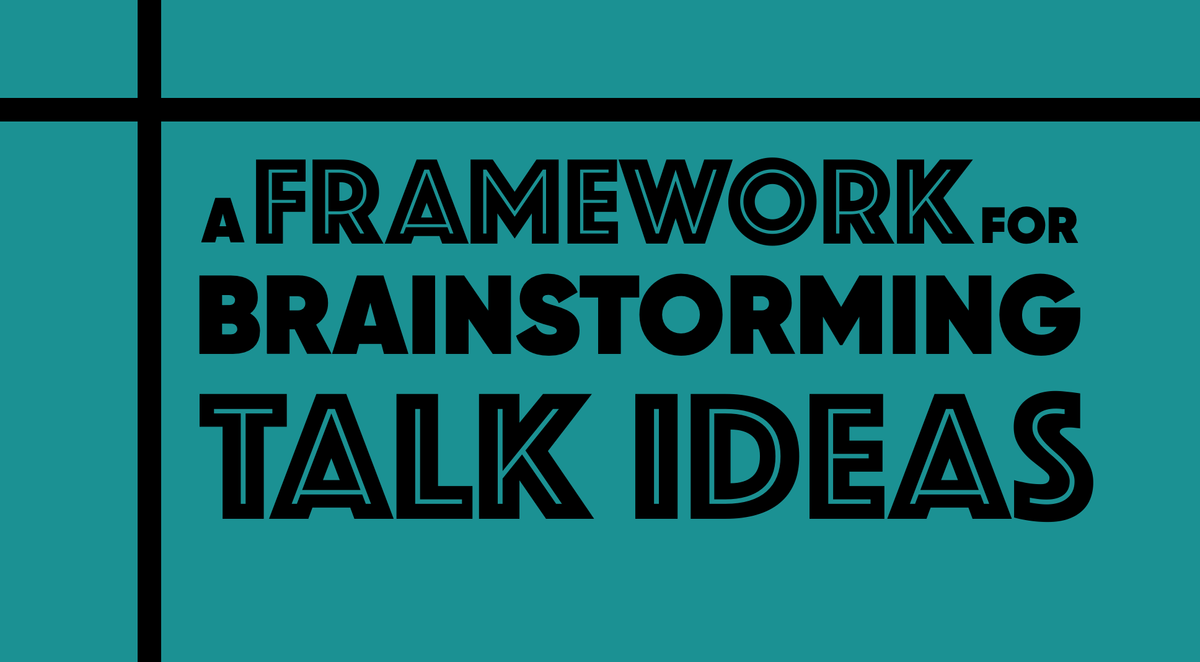
So you've decided you want to give a talk.
You've made that step to change your mindset: You have something worth talking about. You just don't know what to talk about yet.
How do you discover what you should be talking about?
Over the next few weeks I'll be sharing various brainstorming techniques and methods, all to get you thinking about different types of talks that you could give!
There's no one way of doing this. Part of the fun of brainstorming is trying out different methods and experiment with new ways of coming up with ideas. A method that might work for one person might not actually work for you. A method that worked for you last year, might not be as helpful for you this time around. It's worth trying out different techniques and approaches to help you come up with different ideas.
Now the way my brain works is that I like having structures and frameworks in place for me to interpret and think about concepts in different ways. So before I share some more exercises for brainstorming ideas, I first want to help you to change your perspective in how you approach your talk ideas.
Often when people start thinking about talk ideas, they'll approach it from their own point of view: what are the things that they can talk about? What are the ideas that they are interested in? What are the things that they are good at?
It requires you to be self-reflective and examine what are the things that you know that you could share with others. For some people that will be enough of a prompt to come up with talk ideas. It is a good approach and in future brainstorming ideas posts, we'll be revisiting this way of thinking more.
But when I was just getting started with public speaking, it felt pretty intimidating to me to do that type of self reflection: what could I possibly know that could be worth doing as a talk? (Spoiler alert: a lot. We all know so many things!)
What helped me was to change my perspective to consider the following:
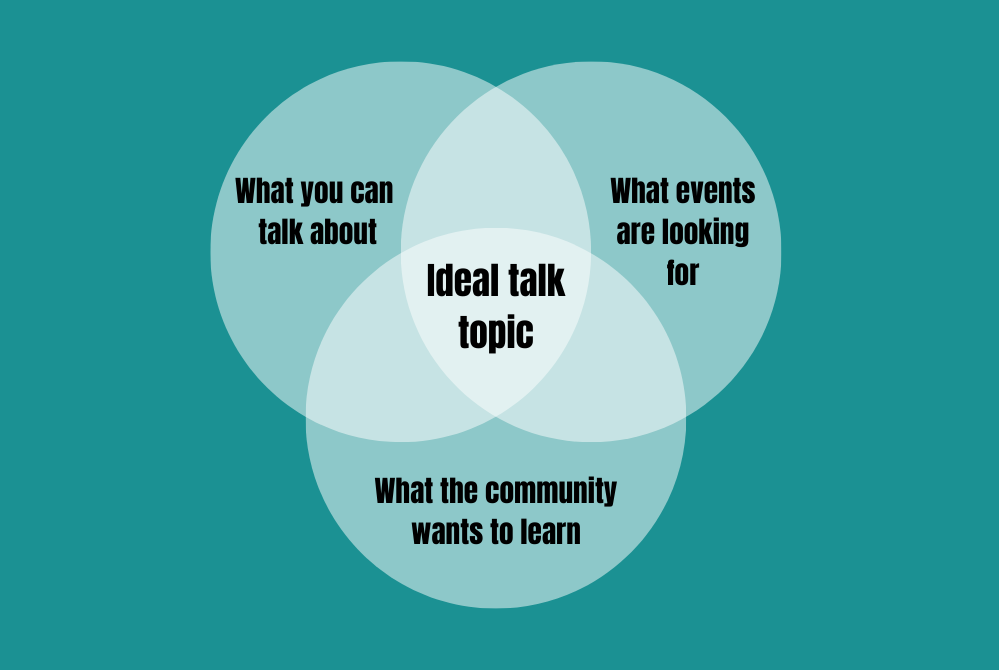
Rather than only thinking about myself and what I wanted to talk about, I changed my framing to consider what others would want to hear about. For me, this was super helpful. It changed my approach to reflect on the things that I know that could help others or that others wanted to learn about. What are the things I had done recently that people would benefit from knowing about? What are the common challenges people are facing with this new technology or this type of problem? What are the ways
I think with every talk you do, it helps to consider these three elements:
- What you can talk about or what you want to be talking about
- What events are looking for
- What the community wants to learn
Framing it this way, gets you to reflect on what talk topics other people want to hear about. It also puts you in a better position to get your talks accepted, cause your initial push to create the talk is coming from from that perspective that others want to know more about this topic. Another benefit is that sometimes the ideas that you come up with this way are topics that you'd like to learn more about: you're not limiting your talk ideas to things that you already know!
Another subtle shift of framing the above, is like this:
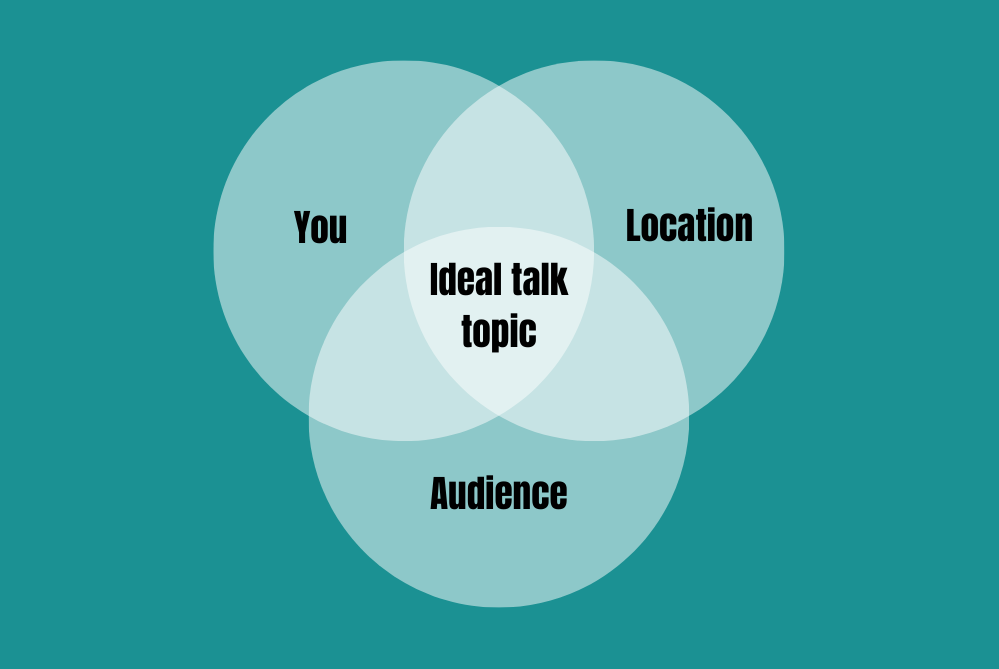
You: What do you want to talk about? What things are you interested in? What things are you good at?
Location: Where do you want to do this talk? Is it at a specific conference or meet-up? Is it internally at work? What type of talks get given at this event? What is the goal of the event?
Audience: Who is your audience? What is their background? What do they want to learn? What do they know already? What do they want to become?
When it comes to brainstorming talk ideas, I find that using the above framework allows you to approach the challenge of deciding what to talk about in different ways: start with the category that you're most drawn to or have the most opinions already about. There's no right or wrong way to approach this, but it allows you to focus your brainstorming on considering one of these elements first.
If you have a specific location in mind, it can help you come up with a topic that is appropriate for it. This way you start with the event and the event organisers, and ask yourself: what type of talk do they want to see? What type of talks have done well at those events previously? What talks will gets accepted? Once you know the location, you likely have an idea of what the audience there looks like, and then can shape the topic to them.
If you have a specific audience in mind, it can help you come up with talks that target that specific audience: what types of talks do they want to see? What things do they want to be learning or hearing about? And once you know your audience, that can help you figure out what events would be suitable to give the talk at.
If you don’t have a location or an audience in mind, then we're back to that original framing: what is it that you want to talk about? What things are you interested in?
So: when taking time to brainstorm talk ideas, keep the above framework in mind. If you're unsure where to start, begin with thinking about the events that you'd like to speak at or the community that you want to help. Consider what other people would like to hear about and use that as a starting point to generate ideas.
What are your techniques for brainstorming talk ideas? What do you do to reflect on ideas? Leave a comment behind below with your thoughts.
Interested in speaker coaching or speaker training? Get in touch with me to discuss what you’re looking for.
Liked this post? Sign up to my newsletter below to get future blog posts delivered straight to your inbox.
